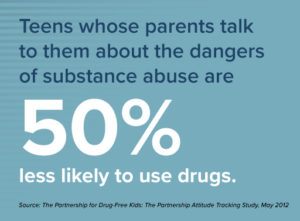13 Tips for Starting a Conversation with Your Teen About Substance Use
If you’re one of the 89% of parents1 who are likely to discuss OTC misuse with their teen(s) in the future, you’ve come to the right place.
Starting a discussion with your teen about substance use isn’t always easy, but it comes with rewards — teens of parents who talk to them about the danger of substances are 50% less likely to use drugs than those who do not receive this message at home. Even if you think your teen is well-aware of the risks, it is always the right time to reaffirm the message.
Here are 13 tips to help you start the conversation:
1. Consider your goals for the conversation. You can also write them down and review them later to better assess how effective the conversation was.
2. Set the scene. Your teen may feel less “boxed-in” or uncomfortable if they don’t feel pressured to engage in eye contact during the discussion. Find time to take a stroll or make use of a routine outing to strike up a conversation.
3. Be positive. You set the tone for the conversation with your words and your nonverbal signals. Maintaining a calm voice and relaxed body language can help your teen feel more at ease.
4. Use “I” statements. Let your teen know where you’re coming from, using statements like, “When I hear about people your age abusing drugs and alcohol, I’m anxious. I want to feel confident that I’ve given you the tools to make better decisions.”
5. Ask open-ended questions. Ask your teen how they feel about the subject. Be an active and respectful listener. Base any follow-up questions on the things they’ve said, to demonstrate that you’ve heard them and want to keep listening.
6. Practice active listening. The Partnership to End Addiction suggests listening to your teen without interruption and then reflecting back what you hear them say.
7. Be honest and speak from the heart. Your child may ask you about your history with substances. Kept secrets have a way of revealing themselves in a family, and you may damage your credibility with your child if you lie. If you engaged with substances as a teenager, speak candidly with your child about why you would not make those choices again. Explain why it was a mistake (for instance, physical harm, hangovers, emotional consequences). Emphasize that you were lucky that things didn’t go badly — for some people, all it takes is one experience with an illicit substance to kick off a chain reaction that becomes an addiction.
8. Acknowledge the role of peer pressure. Discuss your own experiences with peer pressure as teachable moments. Talk about how you navigated a sticky social situation, and what the most effective response would be in a similar scenario. Understand that in your teen’s adolescent years, they are likely to hear persuading comments from friends that paint a rosy and unrealistic portrait of drugs and alcohol.
9. Discuss the risks of substances. Brush up on the consequences of OTC medicine misuse here. Emphasize that all medicines come with risks and should be respected. Be sure to highlight the serious physical consequences of other drugs and alcohol, as well. Beyond physical consequences, note the potential legal consequences of drug and underage alcohol consumption. Be sure to discuss the danger substances can pose on your teen’s ability to achieve milestones like graduation, landing employment, keeping a driver’s license, etc.
10. Set expectations. “Be clear and say, drugs are not something we do in our family,” says Drug Prevention Specialist Joronda Montano. “If a teen believes that their parent disapproves of drug and alcohol use, they are going to be less likely to use. On the other hand, if the teen thinks their parent is okay with it, they’re going to be more likely to use.”
11. Decide on consequences together. Ask them: “What do you think the consequence should be?” This way, there are no surprises about what happens if they are found to be using substances.
12. Give your teen a way out of a risky situation. Let them know that they can always count on you if they need a ride — or any help out of a situation that they’re in. Decide on a code word they can use if they need emergency help, and you’ll be there, no questions asked.
13. Don’t make it a one-time conversation. The dangers of alcohol and drug consumption are too important for this conversation topic not to be a running thread. Keep an open dialogue. Make sure your teen knows that no matter what, they can always count on you.
Want additional ideas? Get advice straight from the source with A Teen’s Guide for Parents: Inspiring Honest Conversations.
1 David Binder Research Parent Survey, 2020
Take Action
Increased awareness can only mean increased prevention. Join us in the fight against teen cough medicine abuse by exploring and sharing our free resources.

